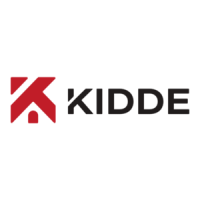General Information
P/N 06-236716-001 1-9 August 2007
• Continuous
The three circuits are supervised, power-limited, and are compatible with conventional UL
listed, 24 Vdc notification appliances. They can also be used with the following synchronizable
horns and strobes:
• MT series multi-tone horns and horn/strobes
• NS series horn/strobes
• NH series horns
• RSS(P) series strobes
The MT and NS series network appliances provide the option to use silencable horns and non-
silenceable strobes on the same NAC.
Multiple NAC circuits (connected to audible devices only) programmed with the same master
code pattern are synchronized, regardless of any differing starting times that preceded their
concurrent operation.
The control unit is designed for user selection of an intelligent synchronization feature. This
feature allows the silenceable horn to be shut off while the strobe continues to flash in
synchronized fashion. Each NAC is rated 1.5A at 24 Vdc and is suitable for polarized 24 Vdc
appliances only.
The maximum number of synchronized devices is 35.
1-4.4.2 AGENT RELEASE CIRCUITS (ARC)
The AEGIS has two (2) dedicated, independently controlled Class B ARCs compatible with
devices listed in Appendix B.
The release circuit may be programmed for an ON time of 90 seconds for Control Heads and
either 10 minutes, 15 minutes or On-until-reset for Deluge/Pre-Action Solenoids. When
programmed for initiators, the ARC remains ON for 200 milliseconds.
The ARCs can be configured to activate on a variety of conditions based on inputs from manual
release, detection circuits and supervisory circuits. Activation of the ARCs can be delayed from
0 to 60 seconds (in 10 second increments) in automatic release mode. Manual Release can be
delayed from 0 to 30 seconds (in 10 second increments).
The ARCs are suitable to operate different release device types on both circuits. In other words,
ARC1 may activate solenoids and ARC2 may activate an initiator. See Chapter 2, Installation.
ARCs are not inherently power-limited. For the circuits to be power-limited, the ARC should be field
terminated with an in-line supervisory device P/N 06-220023-001. ARCs activating initiators cannot
be made power-limited.
1-4.4.3 PROGRAMMABLE/DEDICATED RELAYS
The Kidde AEGIS has three independently programmable relays and one dedicated Trouble
relay. The relays are Form-C type with contacts rated 3A @ 30 VDC / 120 VAC (resistive).

